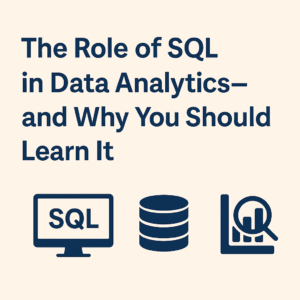In the rapidly evolving world of data-driven decision-making, two roles often come up: Data Analyst and Data Scientist. While they may sound similar and share some overlapping skills, these positions have distinct responsibilities, skill sets, and impacts on an organization. Understanding these differences is crucial for professionals deciding on their career path and for businesses looking to hire the right talent.
What is a Data Analyst?
A Data Analyst is a professional who collects, processes, and performs statistical analysis on data. Their main goal is to transform raw data into actionable insights that help business teams make informed decisions.
Key Responsibilities:
- Collecting and cleaning data from various sources.
- Using statistical tools to interpret datasets.
- Creating reports, dashboards, and visualizations.
- Identifying trends, patterns, and anomalies in data.
- Supporting business stakeholders with data-driven insights.
Typical Tools:
- SQL for querying databases.
- Excel for data manipulation.
- Data visualization tools like Tableau, Power BI, or Looker.
- Statistical software like R or Python (basic level).
What is a Data Scientist?
A Data Scientist combines expertise in programming, statistics, and domain knowledge to build advanced analytical models and algorithms. Their work focuses on predictive analytics, machine learning, and uncovering deeper insights from large datasets.
Key Responsibilities:
- Designing and implementing machine learning models.
- Conducting complex statistical analyses.
- Preparing and transforming large datasets.
- Building predictive and prescriptive models.
- Communicating findings to technical and non-technical audiences.
Typical Tools:
- Programming languages like Python and R (advanced).
- Machine learning libraries such as TensorFlow, Scikit-learn, PyTorch.
- Big data technologies like Hadoop and Spark.
- SQL and NoSQL databases.
- Cloud platforms (AWS, GCP, Azure).
Key Differences Between Data Analysts and Data Scientists
| Aspect | Data Analyst | Data Scientist |
|---|---|---|
| Focus | Descriptive analytics — what happened? | Predictive and prescriptive analytics — what will happen and what should we do? |
| Skill Level | Intermediate in statistics and visualization | Advanced in programming, statistics, and ML |
| Data Size | Typically works with structured datasets | Works with both structured and unstructured, large-scale data |
| Tools | SQL, Excel, Tableau, Power BI | Python, R, ML frameworks, big data tools |
| Outcome | Dashboards, reports, business insights | Predictive models, AI applications, strategic recommendations |
| Typical Background | Business, statistics, social sciences | Computer science, engineering, statistics |
Career Paths and Overlaps
While the two roles differ, there is a significant overlap, and many organizations expect analysts to have some data science skills and vice versa. For example:
- A Data Analyst might start learning Python and machine learning to transition into a Data Scientist role.
- A Data Scientist may spend time creating dashboards and reports, tasks typically assigned to analysts.
Which Role is Right for You?
- Choose Data Analyst if you:
Enjoy working closely with business teams, have a knack for storytelling through data, and prefer focusing on interpreting historical data. - Choose Data Scientist if you:
Have strong programming skills, enjoy building algorithms, and want to work on complex problems involving predictive modeling and AI.
Skills Comparison — Data Analyst vs. Data Scientist
| Skill Area | Data Analyst | Data Scientist |
|---|---|---|
| Programming | Basic SQL, Excel formulas | Advanced Python, R, SQL |
| Statistics | Descriptive statistics, hypothesis testing | Advanced statistics, Bayesian methods |
| Data Visualization | Tableau, Power BI, Excel charts | Advanced visualization with Python (Matplotlib, Seaborn) |
| Machine Learning | Rarely required | Core skill (modeling, tuning) |
| Data Cleaning | Moderate data wrangling | Extensive data preprocessing |
| Big Data Tools | Limited to structured data | Hadoop, Spark, NoSQL databases |
| Communication | Translating data to business insights | Explaining complex models simply |
| Domain Knowledge | Business-specific knowledge | Cross-domain expertise preferred |
Conclusion
Both Data Analysts and Data Scientists are vital in harnessing the power of data to drive business success. Understanding their unique skills and responsibilities can help individuals tailor their learning paths and organizations to hire effectively. Whether you’re starting your journey in data or looking to specialize, knowing these key differences will guide your decisions.
